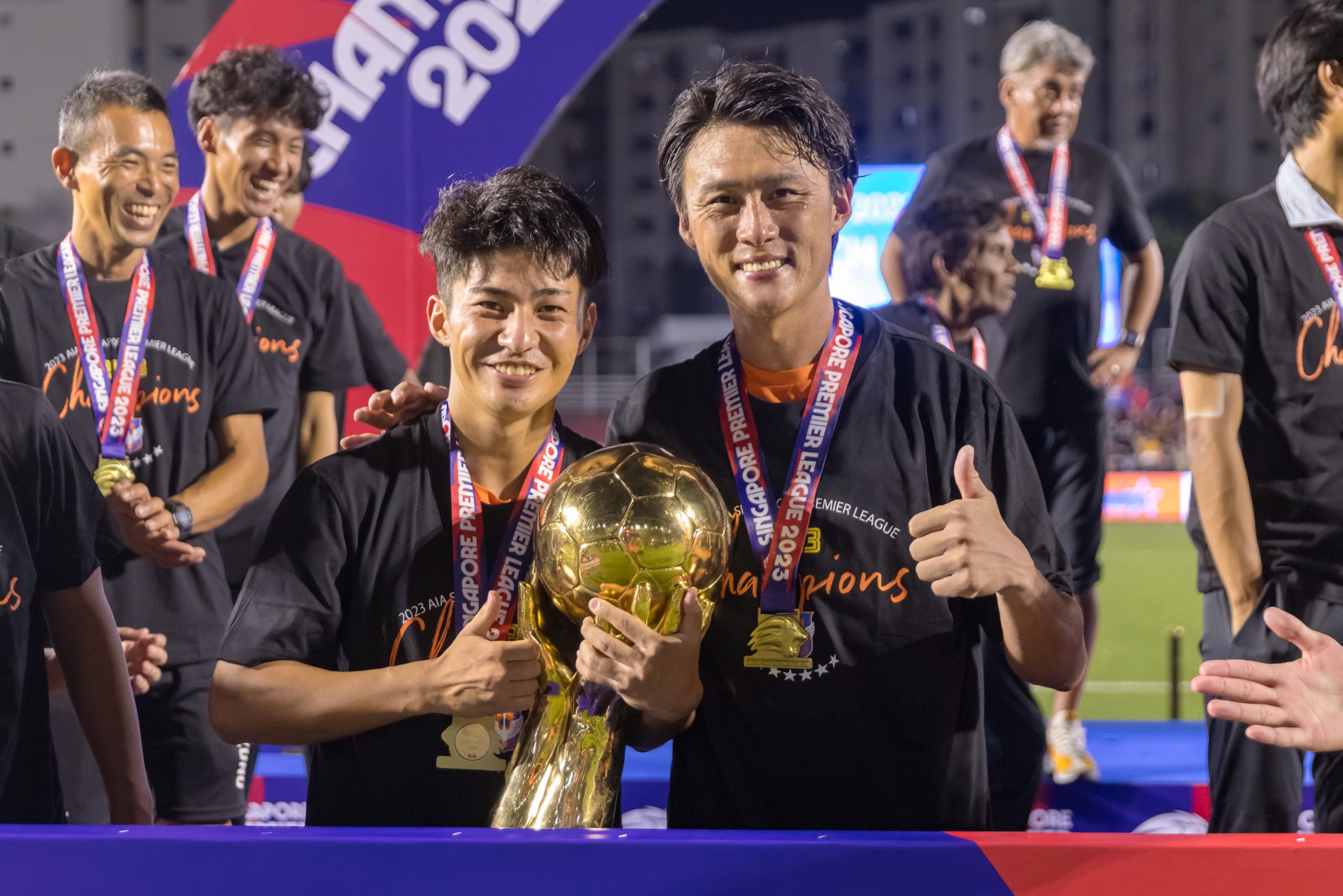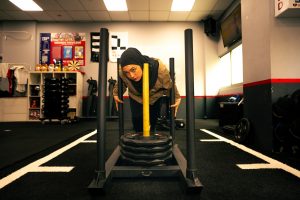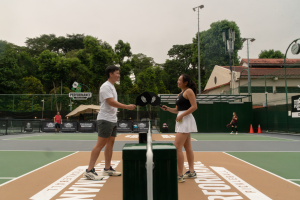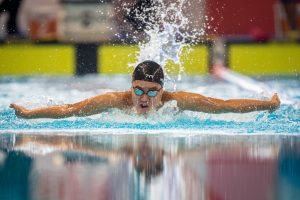Image courtesy of Albirex Niigata FC
Tadanari Lee stands in the middle of a football field. The astroturfed 2,700-seater Jurong East Stadium is modest, but the veteran doesn’t mind. He might reminisce about the times he kicked off games at Southampton’s St. Mary’s Park or under the snow-covered grandeur of Saitama Stadium, but he’s fine where he is now.
He’s about to kick off a match between his team, Albirex Niigata, and Hougang United.
The 37-year-old player with (arguably) the most illustrious career in Singapore Premier League history fixates on the ball. The buzzing from the stands stills. The electronic scoreboard, comically oversized compared to the humble seating gallery below, begins counting down. Lee exhales. With a swift practised motion, he passes the ball to his teammate. The crowd roars.
From the stands, you can almost touch the players. You see them spurting water over themselves and hear them shouting in English and Japanese. Albirex’s manager, Kazuaki Yoshinaga, sits, scrutinising the game as a tiger does its prey; Hougang United’s manager, Marko Kraljević, yells instructions and rushes to return stray balls.
The game feels tangible, more so than on TV or in the National Stadium galleries. It’s so tangible that the ball hurtles into the stands. It’s caught by a quick-witted samaritan behind me, prompting cheers from the crowd. My smartwatch beeps—my heart rate just spiked.
What you can’t get on StarHubTV+
Albirex’s attractive football intoxicates. It’s fast-flowing, with Albirex hoarding the ball and swiftly directing it towards the opponent’s goal, resulting in a flurry of goal opportunities. Upon losing the ball, the players are disciplined yet frenetic, hounding Hougang like a pack of wolves.
Albirex fans acclaim every progressive pass and attempt at goal. When Tadanari Lee misses a header, the crowd groans before chanting ‘Lee, Lee, Lee!’ to convey their appreciation. In return, the players applaud supporters during breaks in play.
Even defensive actions are celebrated. When Asahi Yokokawa, Albirex’s 21-year-old captain, heads away a dangerous ball, fans cheer as if it were a goal. Fans being fans, there’s banter: when Hougang’s Jordan Vestering fouls an Albirex player, nearby fans taunt, ‘You’re not even the best Jordan in Singapore!’
I’m sitting with Muhammed Haziq Hafizhan, who runs the Albirex fan group, Swan Army, with his brother. The name comes from Albirex’s adoption of swan motifs: the Japanese port city of Niigata is a popular stopover for swans.
Haziq is relentless. When Albirex concedes a free kick, the 18-year-old rallies supporters with a spirited ‘Defence!’ chant while orchestrating kids to beat the drums.
He tells me that there is a bias against Albirex as a ‘foreign club’ regarding fouls.
“But Albirex doesn’t fight back, instead playing so well that we win anyways,” he grins.
When I met Haziq before the game, he looked turtle-like, lugging oversized bags spilling with drums, flags, and a cardboard trophy. He wore an orange—Albirex’s official colour—fanmade jersey with ‘Swan Army’ and ’12’ emblazoned behind. Haziq explains how the club left number 12 unoccupied because “the fans are the 12th man”.
As we talk, enthusiastic kids approach Haziq for high-fives. Haziq hugs and daps everyone up: the marshalls, the fans, the coaches leading the warmups, former youth players coming back to spectate, even Hougang United fans.
I join him in the stands to set up his support gear—his brother does the same at the grandstand opposite. Off the field, Haziq pumps out social media content for the Swan Army’s 800-odd followers. His work has an impact: ‘Are you doing YouTube later?’ the kids crowding around him ask. They cheer when he says yes.
Albirex’s number 5, Shunsaku Kishimoto, affectionately named Goji after Gojira (Godzilla), passes to Asahi, who embarks on a thunderous charge down the right flank. He catapults in a pinpoint cross towards the box, where the ball is then poked into the net by Albirex’s number 10, Seia Kunori. Haziq leaps from his seat, racing to the rails and waving his flag in a triumphant frenzy.
A Communal Carnival
The half-time whistle was a much-needed breather for Hougang United. Albirex was up three goals.
I head outside only to find a carnival atmosphere. Little pop-up shops offer soft drinks, beer, Japanese bento boxes, and nasi lemak by Albirex’s Singaporean goalkeeping legend Hassan Sunny. His grinning face on the poster was my first glimpse of him; Hougang hadn’t had a shot on target.
J-pop blares from the speakers. The festive ambience extends to the stands. The nearby Pizza Hut outlet is enjoying a field day with countless children clutching pizza boxes.
Most of the kids are wearing Albirex Singapore Football Academy kits. Academy and cheer school members enjoy free admission while seniors and students enjoy price concessions, encouraging families to enjoy matchdays as weekend outings.
A family-friendly atmosphere means a more muted response as opposed to boisterous football ultras. But it’s also approachable, like a family diner instead of a disorderly pub. Ultimately, sport is universal—even mildly interested parents can turn into fanatics.
Albirex’s cheer school students dazzle the crowd with their pom-poms. Albirex reaches out to Japanese expats through their Soccer School and Cheer School, while their Football Academy caters to locals.
There’s also the Yuhua-Albirex Football Academy, which provides affordable training programmes for the Yuhua community. Haziq is a member of this academy and recounts accompanying the players as a match mascot.
“Twice a year, the whole first team will come down to play with the academy kids. No other team in Singapore does that,” says Haziq.
“When you watch Ronaldo or Messi, you can’t meet them, but you can talk to every player here,” laughs Amir Hamizan, Haziq’s 26-year-old brother who runs the fan club with him.
“After every victory, the team performs a loco loco dance with the fans. The kids love it.”
Amir details how Albirex maintains a close relationship with its fans.
“When we asked about starting a fan club, the management was supportive. You look at big clubs like Manchester United—management and fans don’t see eye-to-eye,” Amir continues.
“Banners and flags might not be allowed by the FAS (Football Association of Singapore), but the club backed the fans.”
Give and Take
With Albirex being the only big team in Singapore’s West side, much of their local fanbase hails from the area. The team ingratiates themselves to the community through grassroots outreach.
“Recently, we went to Westspring Secondary School,” says Dominic Wong, the 26-year-old team manager. “We coached their students and invited them to a home game.”
“The team does charity work,” Haziq exclaims. “’The team gives hampers to the less fortunate. They do community cleaning. They help with Yuhua CC’s Charity Walk for Rice.”
These efforts raise the team’s visibility and compensate for their perceived ‘foreignness’.
“’Instead of foreign clubs (except Albirex, who has been around and did their best in the local community), I rather have more local clubs with more foreigners to bring up the quality of the league,” reads one message in The Final Whistle, a Telegram group chat for local football games.
“Other clubs should be closer to their communities,” Amir ponders.
To be fair, there are similar efforts by other clubs with comparable fan support. Lion City Sailors collaborates with Tasek Jurong—it’s part of why President Tharman recently visited them. Tampines Rovers does similar outreach at secondary schools.
But this needs to be strengthened further. While it’s natural for some clubs to have more fans, the smaller clubs must retain strong support within their geographical vicinity.
“It’s not entirely the clubs’ fault,” says Amir. “When FAS made clubs share stadiums, it uprooted these clubs from their communities.”
Case in point: Albirex shares Jurong East Stadium with Tanjong Pagar United, even though Tanjong Pagar itself is an optimistic half-hour away via MRT. That said, even before this stadium-sharing initiative, match attendance was already dwindling.
Albirex is well aware that their foreignness will only compound criticism, which explains why they cultivate strict team-wide discipline. Players can’t colour their hair, for example. Hassan Sunny shared an anecdote on the Silver Fox podcast about Coach Yoshinaga holding a team meeting after a vaping scandal at another club to ensure it will never happen at Albirex.
Professionalism attracts sponsors. The stadium side netting adorns various logos from Kirin, a Japanese beer company, to Salonpas, a local analgesic patch company, to even chemical companies like Denka.
Albirex designates sponsor days, like the bizarre-sounding Salonpas Day. During half-time, they have a promotion for a free towel with every two cups of Kirin.
“The ads work,” laughs Amir. The financial support sustains Albirex when similar satellite clubs from clubs like Beijing Guoan or Dalian Shide have long since folded.
While most Singapore Premier League clubs received subsidies of $800,000 last year, Albirex is said to receive less as a foreign club. Commercial sponsorships bridge the gap, and they have been zealous—the club’s webpage lists over 50 partners, quintupling the amount that most other Singaporean teams have.
Albirex’s Japanese connection helps, but their example should be followed in a league that desperately needs private investment.
Constellation of Stars
The match continues feverishly, though player fatigue leads to disorganised play. Neither team sustains possession as players scramble the ball away from each other, like teenagers mashing the tackle button on FIFA.
Amidst the chaos, Tadanari’s quality shines. His dribbles are cleaner; his passes more precise. He doesn’t sprint—he glides across the pitch, conserving energy for moments to leave his indelible mark.
He executes a backpass to a teammate, resulting in a desperate tackle from the opposing team, which draws a foul. His teammate delivers the free kick towards the box, and Tadanari glances upwards like a meerkat before deftly lobbing the soaring ball into the net. Four-nil now.
Tadanari drops onto one knee, arches his back and mimics firing an arrow into the sky. It’s his signature pose: the same move he used after his acrobatic last-minute volley against Australia in the 2011 AFC Asian Cup finals. That winning goal forever etched his name into Japanese football history.
The team excitedly huddles around Tadanari despite it being their fourth goal of the match. They are that persistent.
That attitude is exemplified by Albirex’s number 14, Shodai Yokoyama, who runs up and down the pitch like a dynamo. Among the team, he’s known to be the first in and last out of practice.
“We Japanese hate losing,” the 22-year-old midfielder tells me. “I lost often during secondary school. That experience is why I practise hard.”
Training is difficult, especially for Japanese players unaccustomed to Singapore’s humidity. Coach Yoshinaga is demanding, but he cares for his players. His attention to detail borders on micromanagement.
Albirex players, most of whom are sourced from colleges in Japan, say football in Singapore is more challenging and physical than university football. They bring up Maxime Lestienne from the free-spending Lion City Sailors, a Belgian import who, years ago, scored against Manchester United in the Champions League.
The responses I hear today differ from Albirex players of years past, who noted how Singapore’s football standard is ‘not very high’.
It isn’t just competitive desire. There are career pressures: “I received no local offers after university,” Goji says. “I could pursue my dream thanks to this offer from Singapore.”
“I had the opportunity to train with a J League side, but I got injured,” Shodai concurs. “This is the only choice.”
The pressure is heavy, especially when they’re on single-year contracts to prove they can make it. “This year, my focus is to improve my skills,” says Goji. “I want to show my play in matches and training because you can never be sure who might be watching.”
The players try to enjoy their year in Singapore. “On my off days, if I’m not resting for competitions, I’d go out and eat,” Goji enthuses. “My favourite is the chicken rice at Lau Pa Sat.”
“Mine is satay at Lau Pa Sat and East Coast Park,” Shodai adds. They mention team excursions for meals and bowling, which builds team cohesion with the Singaporean players.
The team offers the Japanese players communal accommodations at a condominium block nearby. The team manager, Dominic, helps players with their day-to-day matters, like visa concerns or setting up bank accounts.
“I miss my family, my friends,” Goji remarks.
His face hardens. “But this is the path I chose for myself, so I will go through with it.”
Amongst these bastions of stoicism, though, is the hot-headed fan-favourite often used as an impact substitute player: the diminutive curly-haired 23-year-old Riku Fukashiro. Upon entering the pitch, a makcik hollers his name. Immediately, he unleashes a shot that hits the crossbar.
Riku is absolutely electric, injecting energy into the game as he darts up and down. He sidesteps a defender with the nimble footwork of a ballerina. He propels the ball forward, rousing cheers.
“He did a rainbow flick last time,” exclaims a fan behind me. “Like Neymar!”
What he lacks in finesse compared to the Brazilian superstar, Riku compensates with doggedness. This tenacity is a double-edged sword: Riku confronts the referee when he doesn’t call a foul on a Hougang tackle, needing to be pulled away by teammates.
Riku shoots. The ball rebounds off the keeper, landing at Kunori’s feet. Kunori crosses, sending the ball floating towards Tadanari. The veteran does not miss, making it the fifth goal for Albirex.
The Ship of Theseus
Local youth players Hilman and Shakthi are subbed in at the 85th minute as the game abates.
“The Japanese players are supportive, always giving feedback,” Hilman tells me.
“It was hard communicating at first, so I learnt some Japanese. I can speak simple English and Japanese during games for basic terms like ‘left’ or ‘right’. While I’m not close, I can talk to them when needed.”
(Hilman isn’t the only one picking up Japanese—team manager Dominic beams about his productive use of SkillsFuture credits)
Hilman dribbles through the midfield. “I’m so glad he’s still signed for next year,” a fan behind me declares.
Next year marks a significant shift beyond Hilman: Albirex is fully localising.
When it first arrived on our shores in 2003, the Japanese club was intended to provide a challenge to local football clubs. Today, however, the club says they seek to contribute more directly to the state of Singaporean football.
This change means they’re subject to the same foreign player limits as other clubs. They’ll also represent Singapore in continental competitions should they qualify.
It spells a drastic overnight overhaul in their lineup, though team manager Dominic assures me the transition will be smooth.
“We’ve had discussions with FAS and UTR (Unleash the Roar, the government body recently set up to work with stakeholders to develop Singaporean football). We’ve been preparing for the past few years.”
He points to Adam Swandi and Ilhan Fandi as proof of Albirex’s track record with local players. “Our connections helped Ilhan play in Belgium,” Dominic explains. “Localisation means we contribute more directly to Singapore’s national team.”
“Within the staff, our general manager, Koh Mui Tee, is Singaporean. Half the technical staff is Singaporean. Our kitmen are Singaporean.”
“We want to develop the footballing ecosystem, benefitting Singaporean football and our club,” Dominic continues.
“We’re providing free coaching workshops to create an environment where coaches are competent, which benefits youngsters.”
The way the club is set up now makes it clear that Albirex is here to stay for the long term.
“We’re scouting players who embrace our Albirex way—players who can produce entertaining and competitive football. We’re also looking for senior players like Hassan or Lee to guide our younger players. We won’t be a club that plays for the sake of playing.”
Nazrul Nazari, Hougang’s number 4 with 60 appearances for the national team, hurries to the side of the pitch for a drink. Some fans shout, “Come to Albirex, Nazrul!”
The veteran right-back glances over his shoulder and smiles.
The referee blows the game-ending whistle, signalling the end of the Singapore Premier League season. The scoreboard reads 5-0, reflecting Albirex’s on-pitch domination.
The crowd roars in jubilation as team Albirex lifts the league trophy. Fans pour into the pitch to celebrate with the players. Haziq puts a crown on Coach Kazuaki, proclaiming him King Kazu.
The More Things Change, The More They Stay The Same
Amidst the joy, there’s an undercurrent of fleetingness to the celebrations. Most players will leave by the year’s end.
Tadanari, currently swarmed by hordes of Japanese expats, is retiring. As their contracts expire, Japanese university graduates must seek pastures anew.
“The football level in Thailand or Malaysia is higher. I hope to join a team that provides high-level opportunities,” Goji remarks.
“I wish to return to Japan,” says Shodai. “I want to play at a high level.”
The changes to the club aren’t limited to the team roster. “The transition will be difficult,” Dominic offers, “but it’s also rewarding in furthering our existing community engagement and attracting more local fans”.
I ask if Japanese fans or sponsors might tune out with increasing localisation. “No,” Dominic affirms.
“We want to show we’re competitive and play attractive football. We still have our system of soccer and cheer schools. Our marquee foreign players will likely be Japanese.”
Haziq and Amir are optimistic.
“The formula of discipline, the pedigree, the system is there, regardless of who’s playing. Our youth teams and our women’s team, all local, are doing well. Look at how Ilhan, Fandi Ahmad’s son, came here. Young players who want to play good football will come. Doing it with local West boys will only raise spirits. I believe we’ll still compete.”
How do club changes figure into attempts to change the larger Singaporean football landscape? Dominic tells me that they’ll leave that issue to FAS—Albirex can only do what it can for now.
Amir says that the establishment of UTR appears promising. The changes to Albirex seem aligned with UTR’s attempts to improve the local football development system through broadening access, improving coaching and—in typical Singaporean fashion—offering overseas scholarships to the most promising prospects.
But amongst fans, there is also scepticism: UTR isn’t the first government-led initiative aspiring towards World Cup qualification. While fans understand long-term projects can only be judged after some time, there are rumblings about accountability in the present. There are rumours of friction regarding club football: UTR plans to privatise the Singapore Premier League and have the SPL come under UTR’s purview from last year appear to be delayed.
“UTR was set up because FIFA rules mean the government can’t directly intervene in the FAS,” claims Amir. As fans, they can only hope this uneasy marriage will bear fruit.
The brothers, on their part, say they’ll continue promoting their team and, by extension, local football.
The floodlights dim, and the waxing crescent moon hangs above Jurong East Stadium. I thank Haziq for his hospitality.
“Don’t worry about it,” he smiles. “This is the spirit of Albirex. We are family.”






